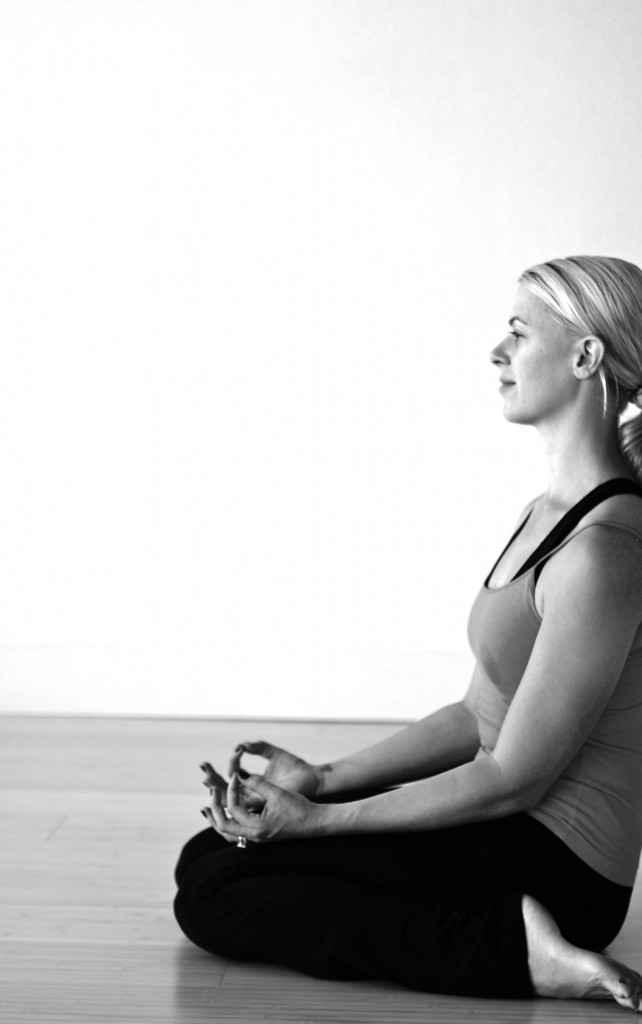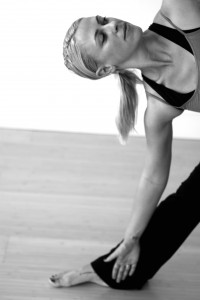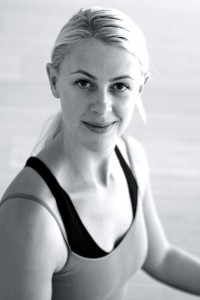 In my experience growing up in America, in my particular demographic, it seemed that everyone knows what yoga is. Most people have taken a class or two at a local gym, or they’ve heard from a friend that they should do yoga as a way to relieve stress, increase flexibility, or maybe balance out their triathlon training. There is some ubiquitous perception that yoga is good for you, but maybe in a supplementary discipline kind of way, like as an add-on after a session of weight training in order to stretch out and wind down. Possibly there is something more to it, but that might be for the leftover hippies of the 60’s that like to burn incense and chant “om” and have out of body experiences… or something like that. In the mainstream West, we like tangible results: sweat and muscle definition. Spirituality is left for another venue.
In my experience growing up in America, in my particular demographic, it seemed that everyone knows what yoga is. Most people have taken a class or two at a local gym, or they’ve heard from a friend that they should do yoga as a way to relieve stress, increase flexibility, or maybe balance out their triathlon training. There is some ubiquitous perception that yoga is good for you, but maybe in a supplementary discipline kind of way, like as an add-on after a session of weight training in order to stretch out and wind down. Possibly there is something more to it, but that might be for the leftover hippies of the 60’s that like to burn incense and chant “om” and have out of body experiences… or something like that. In the mainstream West, we like tangible results: sweat and muscle definition. Spirituality is left for another venue.
The funny thing is, yoga has a way of sneaking up on you. When I first began practicing (I didn’t call it that at the time), I had no intention of having anything other than a peaceful physical experience. I didn’t know that the word yoga is defined as “joining, uniting, or union”, meaning the yoking of the physical to the mental. I didn’t know that the asanas (all that stretching and holding we were doing) were just one part of a philosophical system, and that the goal of the whole program was finding a way for us clumsy humans to transcend our suffering and embrace our divine nature.
I certainly had my suspicious, however, that something beyond hamstring-lengthening was taking place. Why was it that there was a feeling of lightness, of floating, during a hugely strenuous maneuver? How could the control of my breath for 60-90 minutes produce clarity of mind I had never experienced before? Why could recalling my experiences on the mat that morning help with the chaotic tumult of the afternoon at work? I began to feel I was connecting with something real – something that made sense, as elusive as the logic seemed at the time.
In fact, this connection with reality is the goal of yoga. Even though we Westerners might think spiritual and philosophical progress happens through the rigorous machinations of deductive reasoning, yogis believe that mental gymnastics alone will get you nowhere. As Stephen Cope puts it, “over centuries of practice, yogis discovered this truth… that we have to begin our knowing of reality with the body… No spiritual bypass will work. We cannot prematurely transcend the body. We must turn toward it, not away from it.”
 This is the first encounter with a workable worldview I’ve had. Even my experience with Buddhism, while mentally fulfilling, has left me wondering what to do with this hindrance of a physical self. And I absolutely love the fact that so many people have had similar reactions while practicing yoga. They spend a little time moving around on a sticky mat, and suddenly feel clearer, happier, more grounded, and even more integrated as a person, without even knowing why. Maybe we don’t need to know why.
This is the first encounter with a workable worldview I’ve had. Even my experience with Buddhism, while mentally fulfilling, has left me wondering what to do with this hindrance of a physical self. And I absolutely love the fact that so many people have had similar reactions while practicing yoga. They spend a little time moving around on a sticky mat, and suddenly feel clearer, happier, more grounded, and even more integrated as a person, without even knowing why. Maybe we don’t need to know why.
As I struggled to find a working definition of yoga during my teacher training, I was aware of my need to keep the enchantment in the process. I want to preserve that sensation of wonder, of curiosity, and surprise at the incredible benefits of yoking myself to a practice that has provided a small window through which to catch glimpses of the divine. I don’t believe that in our meager human state we are capable of grasping the totality of creation, but I love that this yogic practice gives us a path to move in that direction, while accepting each moment just as it is.
Again, Stephen Cope says it perfectly: “Life is always on the verge of waking us up to the huge mysteries at the heart of this world of flux and time.”

Introducing guest contributor: Darby Shields
Darby is a favored teacher at Cosmic Dog Yoga, and is known for challenging her students while simultaneously offering an experience of calmness and tranquility.

Yoga helps me to feel more connected to myself and the world around me in ways that I never thought possible. It is true what you say that it has a way of sneaking up on you.
I like the idea of maintaining the mystery within which yoga is so often packaged. My only experience of yoga, sadly, is as part of the P90X programme – which I’m sure is a long way from a purist’s view of the discipline. However, something of the power of yoga still comes across, even in that format.
I’d love to learn more about it, though!
I am slowly dipping my feet in Yoga and waiting for it to “sneak up on me” (or at least the confidence to do the actual exercises). Many people, I think, become introduced to it through the gym workouts, but I have come to it from the spiritual/philosophical angle. Lately I have been immersing myself in the conceptual side of Yoga and I find it very attractive. I have almost finished reading “Happy Yoga” by Steve Ross and I can’t remember another book that has made me more happy with such pearls of wisdom.
Honestly, I am nervous to start doing the poses and everything. I’m 220 lb. guy with a past knee surgery and I can’t even bend over to touch my toes. I am trying to stretch every night in preparation but I don’t know how I’ll be able to get in touch with my spiritual side if I am wincing in pain. The philosophy is so appealing to me that I will continue being patient with the physical side of things but it is definitely a challenge.
Chris, you might look for DVDs or classes that emphasize Kripalu yoga. It’s an excellent beginners method for seniors or people who are overweight, recovering from injuries, or especially inflexible. You can use a few basic props (mostly a chair) to lessen the strain of deep stretches, and Kripalu has a special emphasis on spiritual philosophy, meditation, and breathwork, in addition to asanas. Hope that helps!
I had done yoga off and on for about ten years before its wisdom snuck up on me. I remember that I used to be so impatient if a teacher ever dipped into philosophy or spent too long on breathing exercises or in savasana. And, then about two years ago, something clicked and I started changing. I began to feel so much better both on and off the mat that I began to look forward to practicing and wanted to do it more and more. Suddenly, I couldn’t get enough of the philosophy. Before, I had always been afraid that I wouldn’t be fit enough if I didn’t supplement my yoga practice with cardio, pilates and other gym stuff. However, as my practice became more and more about my overall health — mental, physical and spiritual, I gradually stopped worrying and let myself focus on yoga. Ironically, I don’t think I’ve ever been stronger or more toned. But, that is just a side benefit because it has made such a huge impact on how I view the world.
Chris — When I first started practicing more seriously, I had a shoulder injury that made a lot of the poses painful (or painful the next day). I was so gung-ho, it was really hard to pull back and honor how I was feeling. I found that taking my practice in smaller bites — 30 minutes every day and then one full practice a week allowed my body the time to heal and grow stronger. The great thing about yoga is that you start where you are and gently move towards more depth in the poses.
I think I’m ready to try “real” yoga. I need an alternative for spiritual nourishment and I’d love to understand what you’re all talking about. Any suggestions for how and where to find a local outlet for this that will actually be worth it? I’m assuming a gym class isn’t quite what I want.
Are we allowed to say here that we tried yoga and just totally didn’t get it? Or can we only say we loved it? ;)
Heresy! Burn her! ;)
I’m with Heather… really not into it. Gives me a headache. :(
Okay, now that I have a co-conspirator . . . I didn’t have any headache problems, I was just so BORED. So, so bored. The first time (of two) that I went, I kept looking for a clock, dying to know how many minutes had passed. And then it dawned on me: There’s no clock in here on purpose!! We’re not supposed to be counting minutes, etc.
And the talking made me feel like I was at church–setting aside a purpose for my practice for the night, etc. I just wanted to exercise and be completely thoughtless.
??
One more thing and then I’ll take my yoga-defunct self and shut up.
Pilates feels like yoga minus the spiritual/philosophical component, which I think is why I prefer it.
Again, ??? ;)